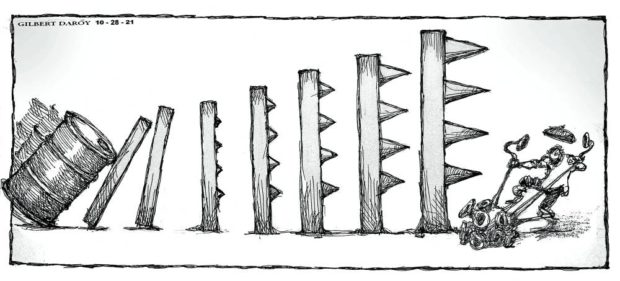‘Worse than the pandemic’

Editorial cartoon
For the ninth straight week, pump prices of petroleum products went up last Tuesday, stoking fears of further hikes in the prices of basic commodities. That prospect will make even heavier the already backbreaking burden that COVID-19 pandemic-stricken Filipinos have been carrying since March of last year.
The latest round of price hikes of 45 centavos a liter for diesel and P1.15 for gasoline brought pump rates in Metro Manila to a range of P42.95 to P54.62 per liter of diesel and P50.65 to P71.59 for gasoline.
From Aug. 31, when the latest string of price hikes began, the total increase has ballooned to P9.10 a liter for diesel, P8.35 for gasoline, and P8.60 for kerosene, bringing the year-to-date increase to almost P20 a liter for gasoline and P18 for diesel, which is the main fuel used in transportation.
And there is hardly any sign that the streak of painful price increases will be snapped soon, as world prices of petroleum products continue to climb—from $50 a barrel early this year to now almost $96.
Demand for the prime commodity is going back to pre-pandemic levels in other countries stocking up for the winter or that have opened up their economy after containing COVID-19 cases. Supply, on the other hand, has been constrained.
The impact of successive increases in diesel and gasoline prices has been especially hard on the poor and vulnerable sectors such as jeepney drivers and fishermen, who are seeing their meager earnings further cut by the spiraling cost of fuel.
According to the Pambansang Lakas ng Kilusang Mamamalakaya ng Pilipinas, the income of fishermen has been slashed to just P120 from P300 a trip because of the price hikes.
Leaders of farmer and transport groups, meanwhile, have described the successive price hikes as “worse than the pandemic.”
Former Agrarian Reform Secretary and Kilusang Magbubukid ng Pilipinas chair emeritus Rafael Mariano lamented the situation of farmers: “With increased production costs, low values for their crops, and a spike in transport costs, their yield would not be profitable for them.”
Jeepney drivers and operators, already hard hit by the lockdowns that had suspended most operations for the past 19 months, were not any better, added Piston national president Mody Floranda. Thus, it was “only right to set price control on petroleum products now, or the prices will continue to soar weekly.”
Last Monday, the Development Budget Coordination Committee announced a remedy: Cash grants worth P1 billion will be given to 178,000 jeepney and bus drivers through the Land Transportation Franchising and Regulatory Board.
The Department of Agriculture is also looking to extend fuel discounts to fishermen and increase the subsidy for fertilizers—prices of which soared to P1,600 a bag from P1,000 in January—to bring down the already high cost of producing food, which has been exacerbated by the P2-billion damage left behind by Tropical Storm “Maring.”
The finite subsidies are, however, a mere salve to the painful situation. The clamor from sectors and some political leaders is for more significant measures to be taken such as suspending the excise taxes on petroleum products—currently at P6 a liter for diesel and P10 for gasoline plus P3 a kilogram of liquefied petroleum gas or cooking gas—to immediately bring down the prices.
Think tank Ibon Foundation pointed out that suspending the excise tax on fuel products and the corresponding increase in value-added tax would not only lower pump prices but also ease the rate of growth in commodity prices.
As of September, inflation has averaged 4.5 percent, overshooting the government’s target of 2-4 percent. “This is worse for the poorest 30 percent of the population for whom inflation is higher than the national average,” said Ibon. “Suspending the oil excise taxes under Tax Reform for Acceleration and Inclusion will provide immediate relief” by a hefty P6.72 a liter of diesel and P6.33 for gasoline, it said.
Energy Secretary Alfonso Cusi himself has asked Congress to allow his department to suspend excise taxes on oil to address sudden or prolonged oil price spikes.
The Department of Finance, however, is cool to the idea, warning that it would mean foregoing P131.4 billion in government revenues next year. “Any suspension of the imposition of excise taxes should be appropriately studied as the revenue to be foregone is substantial and may affect the government’s budget for COVID-19 recovery measures,” said Finance Undersecretary Antonette Tionko in an Oct. 20 memorandum to Finance Secretary Carlos Dominguez III.
How long will that “appropriate study” take before the government finds itself back with the same problem once the subsidies run out—desperate citizens chafing at their battered incomes and the escalating prices of basic commodities as fuel prices continue to rise unabated?















